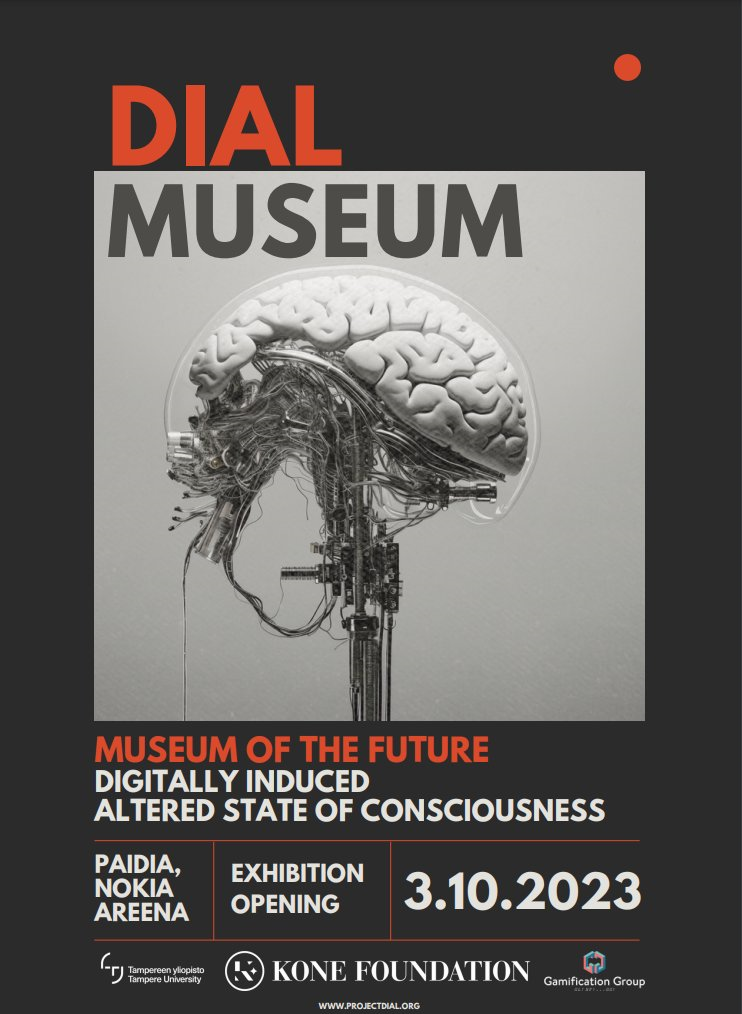1. Title, description, and duration of research
DIAL: Futures research into socio-cultural implications of DIgitally induced ALtered states of consciousness researches the possible directions of digitally-induced ASoC and their implications for individuals and society; the research combines anticipatory anthropology with futures research to identify and investigate the social, cultural, legal, and economic antecedents and effects of digitally-induced ASoC.
Data collection is conducted throughout the project duration (May 2023 - April 2026). Data will be processed during the project and for up to two years after due to publishing and archiving schedules.
2. Data controller
Tampere University Foundation sr
33014 Tampere University
Kalevantie 4, 33100 Tampere
Business ID: 2844561-8
Tampere University Data Protection Officer: dpo [at] tuni.fi (dpo[at]tuni[dot]fi)
3. Contact persons regarding the research registry
Professor Juho Hamari
Kalevantie 4, Tampere University
+358503186861
juho.hamari [at] tuni.fi (juho[dot]hamari[at]tuni[dot]fi)
4. Principal investigator and researchers
Professor Juho Hamari
Kalevantie 4, Tampere University
+358503186861
juho.hamari [at] tuni.fi (juho[dot]hamari[at]tuni[dot]fi)
Postdoctoral researcher Mila Bujić, mila.bujic [at] tuni.fi (mila[dot]bujic[at]tuni[dot]fi)
Postdoctoral researcher Joseph Macey, joseph.macey [at] tuni.fi (joseph[dot]macey[at]tuni[dot]fi)
Doctoral researcher Anatolii Belousov, anatolii.belousov [at] tuni.fi (anatolii[dot]belousov[at]tuni[dot]fi)
Doctoral researcher Terho Ojell-Järventausta terho.ojell-jarventausta [at] tuni.fi (terho[dot]ojell-jarventausta[at]tuni[dot]fi)
5. Content of research records
Contact emails will be collected to facilitate organising the studies (name, email and phone number). Emails will be recorded only on University-maintained server services. Otherwise, collected data will fall under the category of pseudonymised data. Demographic and other personal data to be collected include age, gender, optionally ethnicity, country of residence, occupation, level of education and expertise. Additionally, participants’ voice will be recorded, and images and videos will be taken during the interviews and workshops. Audio and visual recordings will be transcribed and destroyed within a year of finalising the study.
6. Sources of personal data
The collection will be organised through a computerised survey (Limesurvey, under Tampere University), interviews and a series of workshops with a clear notice of the voluntary nature of participation and participants’ right to withdraw at any time. In these cases, the resulting partially completed survey or interview will not be saved or the participant’s material contributions during workshops will be destroyed. Interview and workshop data will be obtained on the research site and recorded in an audio, visual or other material format (futures wheels and tables etc.).
6. Purpose of processing personal data
The purpose of processing personal data is scientific research.
7. Purpose of processing personal data
The lawful basis for processing under the EU’s General Data Protection Regulation, Article 6 Paragraph 1, and the Personal Data Act, Section 4: Public interest, scientific research purposes.
8. Sensitive personal data
DIAL has no intent to collect sensitive personal data
9. Data subjects’ rights and possible restriction thereof
Data subjects have the following rights under the EU’s General Data Protection Regulation (GDPR):
- Right of access
- Data subjects are entitled to find out what information the University holds about them or to receive confirmation that their personal data is not processed by the University.
- Right to rectification
- Data subjects have the right to have any incorrect, inaccurate or incomplete personal details held by the University revised or supplemented without undue delay. In addition, data subjects are entitled to have any unnecessary personal data deleted from the University’s systems.
- Right to erasure
- In exceptional circumstances, data subjects have the right to have their personal data erased from the Data Controller’s records (‘right to be forgotten’).
- Right to restrict processing:
- In certain circumstances, data subjects have the right to request the University to restrict processing their personal data until the accuracy of their data, or the basis for processing their data, has been appropriately reviewed and potentially revised or supplemented.
- Right to object
- In certain circumstances, data subjects may at any time object to the processing of their personal data for compelling personal reasons.
- Right to data portability
- Data subjects have the right to obtain a copy of the personal data that they have submitted to the University in a commonly used, machine-readable format and transfer the data to another Data Controller.
- Right to lodge a complaint with a supervisory authority
- Data subjects have the right to lodge a complaint with a supervisory authority in their permanent place of residence or place of work, if they consider the processing of their personal data to violate the provisions of the GDPR (EU 2016/679). In addition, data subjects may follow other administrative procedures to appeal against a decision made by a supervisory authority or seek a judicial remedy.
Contact information:
Office of the Data Protection Ombudsman
Street address: Ratapihantie 9, 6th floor, 00520 Helsinki, Finland
Postal address: PO Box 800, FI-00521 Helsinki, Finland
Switchboard: tel. +358 29 56 66700
Fax: +358 29 56 66735
Email address: tietosuoja [at] om.fi (tietosuoja[at]om[dot]fi)
The Data Controller follows a GDPR-compliant procedure for responding to subject access requests.



